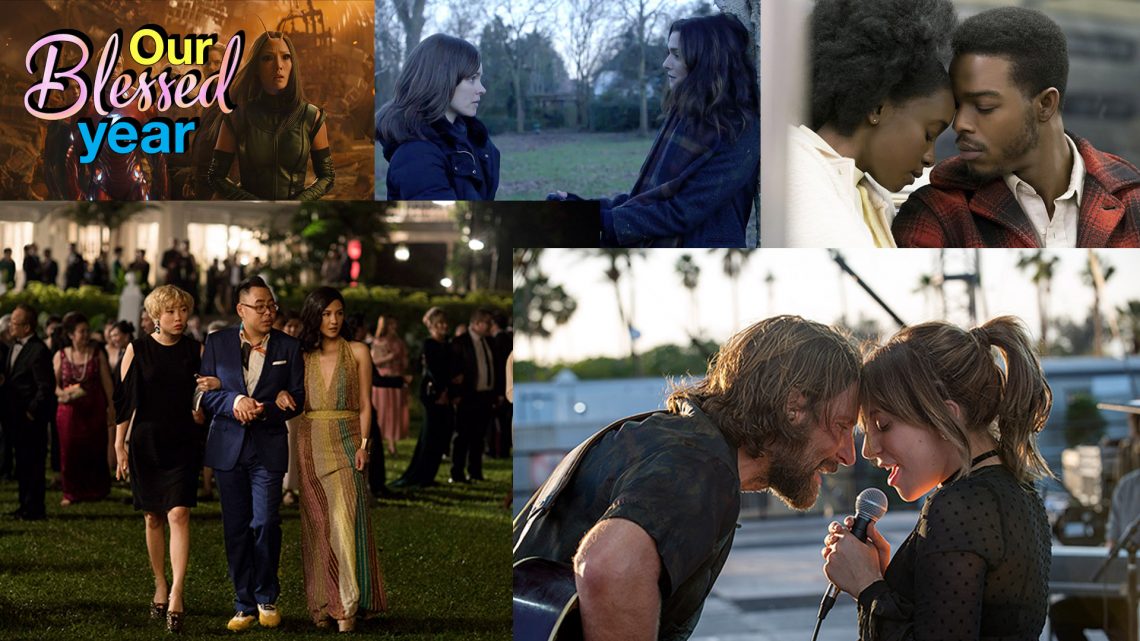
The Movies That Ruined Us in 2018
December 18, 2018Having a good cry is rarely much fun while it’s happening. Pain and sadness are generally the emotions people try to avoid, and few people look great with streaks of mascara running down their cheeks. But once the tears have dried, something wild tends to happen: you feel a million times better.
Few of us go to the movies hoping to ugly cry into our popcorn, but the same thing happens when you watch a sad film. Going on an emotional journey with a character, feeling the highs and lows along with them, offers catharsis and helps us work through our own stuff. In that respect, quietly sniffling in a dark theater with a bunch of strangers can be really endearing. It reminds us that we’re human, and we all need a release sometimes.
And in 2018, when at least one headline a day threatens to reduce us to tears, who needs more doom and gloom in their media diet? This year, Hollywood gave us films about some really heavy topics. Watching them wasn’t always enjoyable, but they made us feel alive.
A Star Is Born
I saw this movie with my girlfriend three times. The first viewing was an ab workout. My stomach clenched every time Jackson Maine (Bradley Cooper, who also directed and co-wrote the film) and Ally Maine’s (Lady Gaga) relationship went from an intoxicating high to an alcohol and pill-fueled low, and if you’ve seen the movie, you know that’s quite often. By the end, those aforementioned stomach muscles were rock hard and my eyes were puddle wet.
The second and third viewings were less stressful; since I knew when the bumps and dips were coming, I could brace myself. They also happened to be in theaters with much better speakers than my first viewing, so the soaring high points of the film, which mostly center on Lady Gaga belting out amazing vocals to her adoring fans, were that much better. This presented room to explore some of the more fun elements of the movie, like whether the song “Why Did You Do That” is actually good. Having that space likely allowed A Star Is Born to ruin me even more, but I liked it. -Beckett Mufson
The Hate U Give
I knew what The Hate U Give was about going in, so I expected it to be sad. Directed by George Tillman Jr. and based off the TA novel by Angie Thomas, it’s the heart-wrenching story of a young black girl (Amandla Stenberg) whose childhood friend is killed by police, and though it’s fiction, it’s rooted in real life. What I didn’t anticipate was just how close to home The Hate U Give would hit. I grew up in St. Louis, which was rocked by the murder of Mike Brown in 2014. Four years later, you still see a lot of dueling Black and Blue Lives Matter signs in front yards.
I flew home for Thanksgiving the morning after a grand jury declined to charge police officer Darren Wilson with murder. There’d been huge protests in Ferguson after the news broke, and a whole stretch of businesses had been looted and torched. When my dad picked me up from the airport, I asked him to drive through Ferguson. I felt smarmy wanting to take photos and videos of charred cars and wrecked gas stations, but I had to see it for myself—not online or on TV—to really understand the magnitude of what was happening.
Too many young black men and women are murdered in America by trigger-happy cops. If we want anything to change, the public has to care enough to demand it. And for that reason, I’m glad The Hate U Give exists. I hope that white audiences watch it, weep during it, and more importantly, decide to give a shit about police brutality because of it. -Kara Weisenstein
Won't You Be My Neighbor
I don’t normally write about movies, unless we’re talking, like, Netflix weed listicles. I made an exception for Won’t You Be My Neighbor, a documentary about children’s television personality Fred Rogers, directed by Morgan Neville. I was floored by this movie. Though Rogers’s life story is interesting and the film had all the bells and whistles of solid modern docs (clean testimonial shots, carefully woven archival footage, a recurring animated motif of a lion, etc.), that stuff wasn’t what made it great. As I wrote back in June:
Won’t You Be My Neighbor is an important film because it makes a convincing case for love above all… Love is at the foundation of everything, and you deserve to love, be loved, and love yourself for exactly who you are. When you read me write this, it might sound corny, but listen to Rogers speak in the documentary. With each impeccably selected interview excerpt, bit of Mister Rogers dialogue, and song clip, the film pulses with Rogers’s singular message of kindness. It’s hard not to let that swelling thrum of compassion wash over you.
-Peter Slattery
Eighth Grade
Watching Bo Burnham’s directorial debut as a twentysomething is a double-punch of feeling really old and remembering how fucking awful it is to be young. In between some of the best-conceived footage capturing what it feels like to be online in 2018, Burnam slots viewers directly into the mind of 13-year-old Kayla (Elsie Fisher) as she navigates Instagram politics, being a YouTube creator (just like everyone else), and the prospect of sexting.
There’s a scene at a pool party that particularly ruined me, conjuring up flashbacks to a similarly awkward summer bash I was invited to at the end of middle school. I remember trying to do as many pushups and sit-ups as I could the day before, but still being mortified at my awkwardly chunky preteen swimsuit bod when I arrived. It’s by no means the scariest and most emotionally taxing part of Eighth Grade, but this movie has something for stressing out everyone.
Also, in case it wasn’t clear from the above, it’s very good. -Beckett Mufson.
Avengers: Infinity War
After a really long work day, I thought to myself, “this would be a great night for a fun action movie that will probably have a happy ending.” I saw that Infinity War was screening early in LA and figured it would be the perfect choice. To give you an idea of my headspace, the Marvel films I’d watched before were Spiderman: Homecoming, Ironman, Thor: Ragnarok, Black Panther, Dr. Strange, and Guardians of the Galaxy (volumes 1 & 2). All of these have fairly happy, or at least bittersweet endings. I also thought watching this many individual Marvel movies made me informed enough to finally go in on an Avengers film. I mean, Guardians has an ensemble cast and Ironman is an “original” Avenger or something.
For some reason, I also thought this was the last Avengers film. This was probably due to the “ambitious crossover” marketing that seemed to imply crazy stakes in a “last movie in the franchise” kind of way. So it’s like 10 PM on a Thursday and I’m waiting for these superheroes to beat Thanos but then they aren’t? Also I don’t know who half of them are. And then Gamora dies? And then half of them...turn into dust? And this whole time I’m thinking this is the ending of the whole franchise. I walked out of that theater in a daze, and then I realized because I’d seen an early screening I had no one to talk to about it and couldn’t share it on social media because I didn’t want to spoil it for others. It got a little better when I realized this isn’t the last one. But the impression remains. -Nicole Clark
If Beale Street Could Talk
The sepia-toned slow winding trailer for Barry Jenkins’ If Beale Street Could Talk set to the strumming vocals of Lauryn Hill literally killed me softly. Its mesmerizing closeups and sincere tone built suspense for an epic adaptation of James Baldwin’s love story about a young woman, Tish Rivers (Kiki Layne), having a child with a Harlem sculptor Fonny Hunt (Stephan James). But the trailer didn’t prepare me for the full premise of the movie, which is that Fonny is wrongly imprisoned and Tish’s family has to try to prove his innocence in the deeply racist court system of 1970s New York.
Emotions run high the entire movie, regardless of whether scenes are fixed on romance, the eerie threat of police violence, or the nerve-wracking attempt to clear Fonny’s name. And Jenkins’ deeply intentional camera angles create the feeling that multiple scenes could function as a large framed picture in a black mother’s living room, especially the symbolic image of the couple walking on a dark street with a bright red umbrella. The movie oscillates between the fragile safety of private moments in jazz-filled warm lighting, and the uncontrollable chaos of racism in the outside world. Baldwin’s diagnosis of racism mixed with Jenkins’s intimate portraits of each character creates a full emotional arc, as if your own lover was in jail, or your own daughter was preparing to have a baby. When it ended, I never thought I’d feel relieved to be in 2018. -Taylor Hosking
Disobedience
This movie made me cry, yes, because forbidden queer love in a conservative, patriarchal religious community is painfully heart wrenching. Despite a lot of shame, loneliness, and fear throughout the film, however, Disobedience is notably ends on a hopeful note. (Whereas other forbidden love dramas, like Carol or Brokeback Mountain, usually end with someone dying or being otherwise banished.) Also Rachel McAdams and Rachel Weisz make a really hot lesbian couple. I ship. -Kara Weisenstein
Three Identical Strangers
Just when you think it’s a feel-good documentary about long lost triplets, Three Identical Strangers pulls the rug out from under its viewers. There’s a pretty sinister reason David, Eddy, and Bobby were separated at birth. And bleaker still, not everybody makes it out alive. Yes, I shed a tear or two while watching this movie. I shed a few more when I met the triplets and heard firsthand how angry they were with the men and women who thought it was acceptable to separate children from their siblings, lie to them about it, and turn their lives into a science experiment. This movie spotlights a wild moment in the medical field, and stresses how important it is for doctors to follow the Hippocratic oath: do no harm. -Kara Weisenstein
Crazy Rich Asians
The movie itself was a spectacular affair, and the wedding scene certainly made me misty eyed. But what this movie meant for hundreds of thousands of Asian Americans in the US who finally understood how it felt to be represented on screen—that was worth a good, long cry. -Nicole Clark
Sign up for our newsletter to get the best of VICE delivered to your inbox daily.


